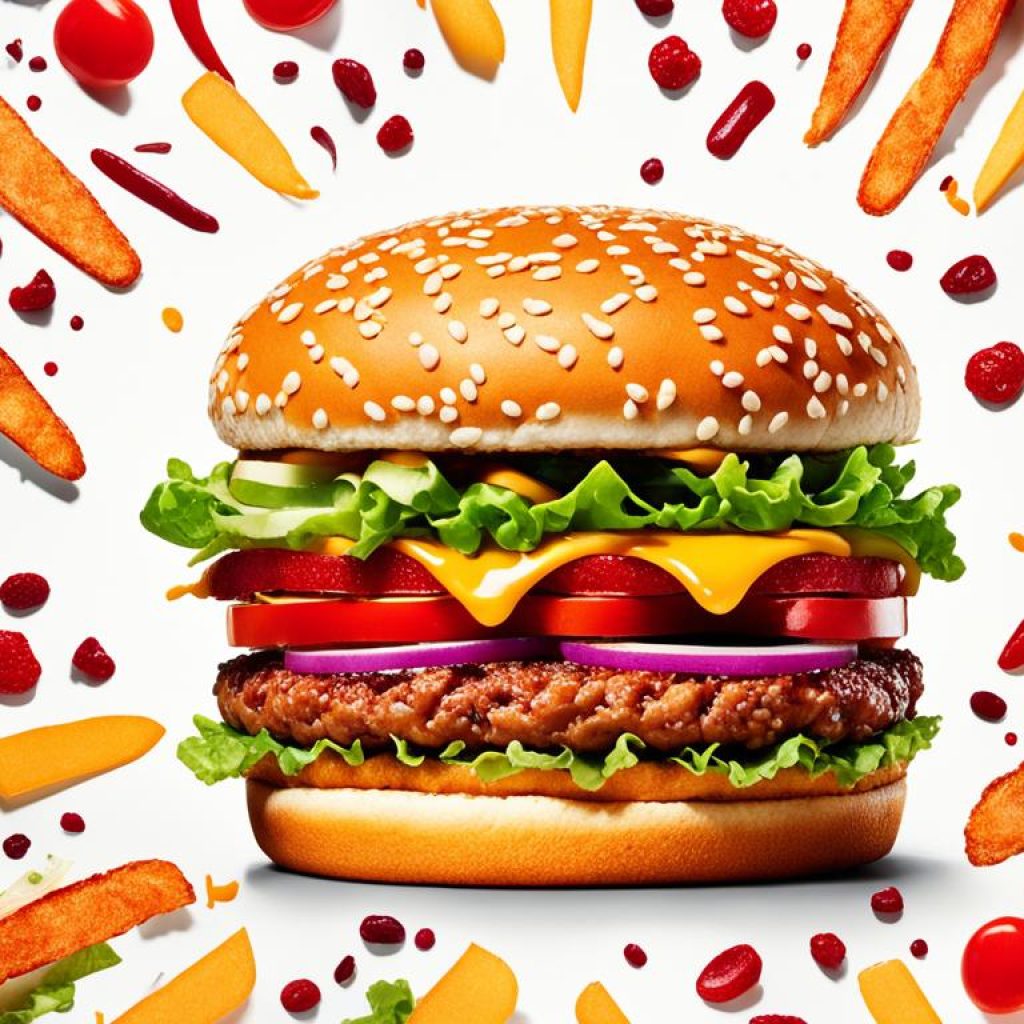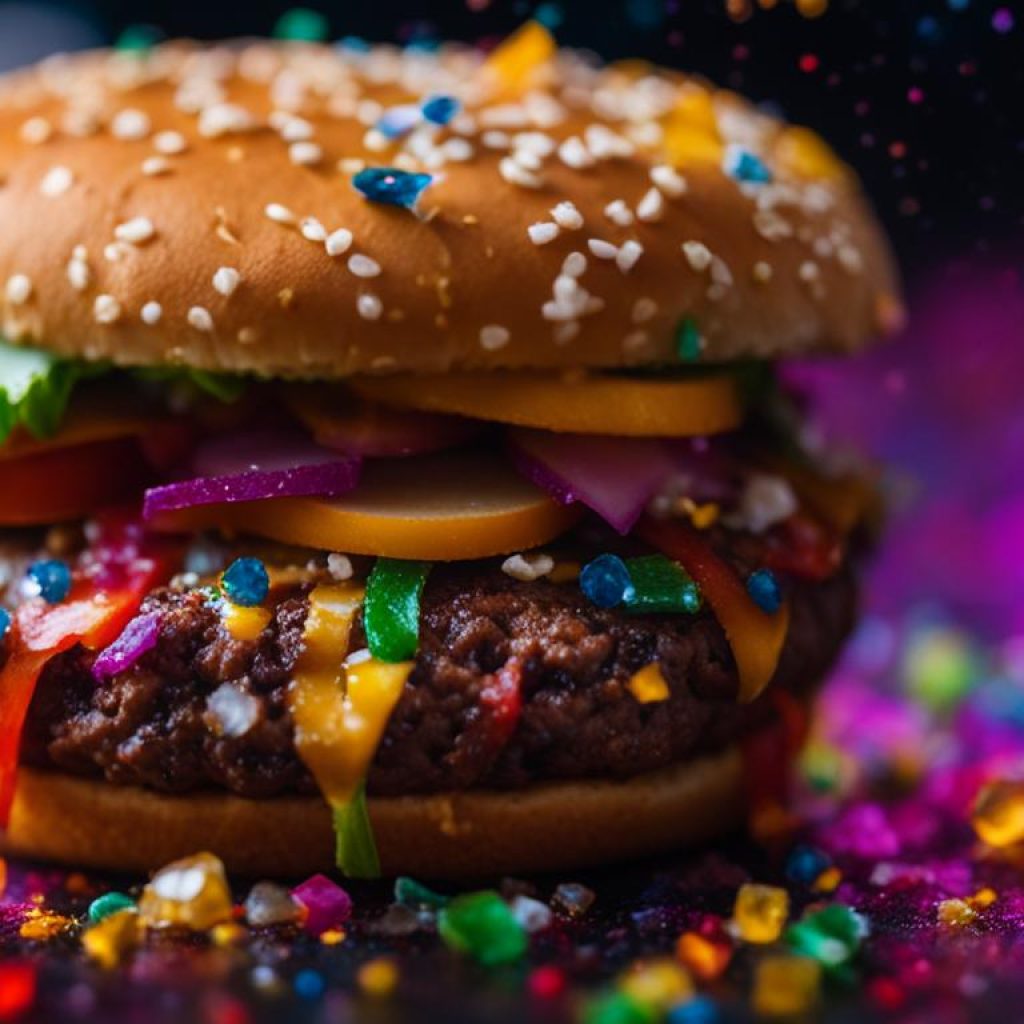Burger King, one of the most popular fast food chains in the world, has recently made headlines with their commitment to removing artificial colors, flavors, and preservatives from their iconic Whopper sandwich in the United States. This move is part of their larger initiative to provide customers with healthier and more natural food options. But what about one specific ingredient that often raises concern among consumers: MSG?
Monosodium Glutamate, commonly known as MSG, is a flavor enhancer that is added to many processed foods to enhance taste. It has been a topic of debate for years, with some studies suggesting potential negative health effects. So, does Burger King use MSG in their menu items?
The answer is no. Burger King has stated that they do not use MSG in any of their food items. They are striving to create a menu that is free from artificial additives and flavors, including MSG. This is part of their commitment to providing wholesome and transparent food practices to their customers.
Key Takeaways:
- Burger King is removing artificial colors, flavors, and preservatives from their food, including their signature Whopper sandwich.
- They do not use MSG in any of their menu items.
- Burger King is committed to providing healthier and more natural food options to their customers.
- Customers can enjoy Burger King’s food without worrying about the presence of MSG.
- Transparency and wholesome food practices are at the core of Burger King’s mission.
The Controversy Surrounding Burger King’s Ingredients
Burger King’s recent decision to remove artificial flavors and additives from their menu has sparked a debate surrounding one particular ingredient: heme. Heme is a highly processed and genetically-modified ingredient used by Impossible Foods to give their plant-based Impossible Whopper a meat-like taste.
“Heme is a key ingredient in the Impossible Whopper, contributing to its juicy and flavorful profile,” says Dr. Angela Matthews, a food scientist at the University of California. “However, the source of heme and its classification as an artificial color additive have raised concerns among consumers.”
Heme, derived from genetically modified yeast, is classified as an artificial color additive by the U.S. government when the product is sold red and uncooked. This classification has sparked questions about the contradiction between the growing demand for natural foods and the popularity of meat substitutes like the Impossible Whopper.
According to Impossible Foods, heme is safe for consumption and has undergone extensive testing. It is important to note that heme is not exclusive to Impossible Foods and can also be found in other plant-based products. However, the controversy surrounding heme highlights the ongoing discussion about the use of highly processed ingredients in the pursuit of creating alternative meat products.
In order to fully understand the concerns surrounding heme and its classification, let’s take a closer look at the debate and the arguments presented by both sides.
The Argument for Heme:
Proponents of heme argue that it is a key component of the meat-like taste in plant-based burgers. They believe that using heme allows for a more realistic and satisfying culinary experience, appealing to individuals who are seeking alternatives to traditional meat products.
Furthermore, heme is deemed safe for consumption by regulatory authorities such as the U.S. Food and Drug Administration (FDA) and has been extensively tested for its potential health risks. Impossible Foods ensures that their use of heme complies with all necessary regulations and guidelines.
The Argument against Heme:
Critics of heme raise concerns about its highly processed nature and its genetically-modified origins. They question the long-term effects of consuming genetically modified ingredients and argue that the widespread use of heme in meat substitutes may contribute to the normalization of heavily processed foods.
Additionally, the classification of heme as an artificial color additive when the product is sold raw and red brings into question the authenticity of meat-like alternatives. This classification raises doubts about the industry’s commitment to providing truly natural and healthy options to consumers.
In conclusion, the controversy surrounding heme in Burger King’s plant-based Impossible Whopper highlights the ongoing discussions about artificial flavors, additives, and the pursuit of creating alternative meat products. While proponents argue that heme enhances the taste and appeal of meat substitutes, critics raise concerns about its highly processed nature and its classification as an artificial color additive. As consumers become increasingly conscious of the ingredients in their food, it is important for Burger King and other food companies to address these concerns and provide greater transparency regarding their menu offerings.

Burger King’s Blacklist of Banned Ingredients
Burger King created a sensational buzz when they released their “Blacklist” of banned ingredients, claiming to eliminate 120 artificial additives from their menu. However, a closer examination revealed that many of the ingredients listed were either already banned by the FDA or seldom used by food companies. Some of the ingredients, such as Brilliant Black BN and Sudan Red, have been prohibited in American food for several decades. Furthermore, Burger King included ingredients separately, even though they are essentially the same, which gave the impression of a longer blacklist than it truly is.
To clarify, here is a breakdown of the banned ingredients on Burger King’s list:
| Ingredient | Status |
|---|---|
| Artificial Color X | Banned by FDA |
| Artificial Color Y | Rarely Used by Food Companies |
| Artificial Color Z | Banned by FDA |
As you can see, the blacklist is not as extensive as initially believed. While Burger King’s effort to eliminate artificial additives is commendable, it is crucial to analyze the accuracy and implications of such claims. The focus should shift to promoting transparent ingredient practices rather than misleading customers with an overstated blacklist.

The Ingredients in Burger King’s Menu Items
While Burger King emphasizes what they don’t use in their food, they don’t provide a comprehensive ingredient list online. However, further research has revealed the ingredients used in their popular menu items.
Whopper Ingredients:
The Whopper bun contains banned ingredients like Calcium Peroxide and Potassium Iodate, as well as processed ingredients like DATEM and Mono and Diglycerides.
Chicken Nuggets Ingredients:
The Chicken Nuggets are seasoned with Yeast Extract (a hidden form of MSG) and Natural Flavors.
Fries Ingredients:
The fries are coated in Sodium Acid Pyrophosphate and cooked in unhealthy vegetable oils like Canola Oil and Soybean Oil.
| Menu Item | Ingredients |
|---|---|
| Whopper |
|
| Chicken Nuggets |
|
| Fries |
|
It is important to note that this is just a partial list of ingredients, and there may be more additives and preservatives in Burger King’s menu items. These ingredients raise concerns about the overall healthiness and quality of the food served.
Burger King’s Definition of “Real Food”
Burger King has launched a campaign to promote themselves as a provider of “real food” by removing artificial flavors and additives. However, their definition of “real food” has been called into question. While they claim to not use artificial flavors, they do use natural flavors, which can often be just as processed. Additionally, while they don’t use MSG, they use Yeast Extract as a replacement, which also contains free glutamic acid. This raises concerns about their commitment to providing truly “real” and healthy food options.
The Verdict on Burger King’s Food
After examining the ingredients in Burger King’s menu items, it becomes clear that while they may have made some efforts to remove artificial additives, their food still contains questionable ingredients. The use of banned or processed ingredients in their buns, chicken nuggets, and fries raises concerns about the overall quality and healthiness of their food. While they may not use certain additives like high-fructose corn syrup or artificial flavors, they still rely on alternatives that can have similar effects on taste and health.
Questionable Ingredients
Let’s take a closer look at some of the ingredients found in Burger King’s menu items:
| Menu Item | Questionable Ingredients |
|---|---|
| Whopper Bun | Banned ingredients like Calcium Peroxide and Potassium Iodate, as well as processed ingredients like DATEM and Mono and Diglycerides. |
| Chicken Nuggets | Seasoned with Yeast Extract (a hidden form of MSG) and Natural Flavors. |
| Fries | Coated in Sodium Acid Pyrophosphate and cooked in unhealthy vegetable oils like Canola Oil and Soybean Oil. |
While Burger King may have removed certain artificial additives from their food, the presence of these questionable ingredients raises doubts about the overall healthiness and quality of their menu items.
“Burger King’s efforts to remove artificial additives are commendable, but their choice of alternative ingredients still raises concerns about the overall healthiness of their food.” – Nutrition Expert

Burger King’s Transparency
When it comes to transparency in the fast food industry, Burger King raises some concerns. Unlike many other fast food restaurants, Burger King does not publish comprehensive ingredient lists for their menu items on their website. This lack of transparency leaves customers wondering what exactly they are consuming and raises questions about what Burger King is not disclosing.
If Burger King truly wants to demonstrate the “realness” of their food and provide customers with the information they need, they should make ingredient lists readily available. By providing full ingredient lists for all their menu items, Burger King would allow customers to make more informed choices and have a better understanding of what they are consuming.
The Importance of Ingredient Lists
Ingredient lists play a crucial role in promoting transparency and empowering consumers to make informed decisions. They provide valuable information about the components of a food product, including potential allergens, additives, and artificial ingredients. By knowing what is in the food they eat, individuals can make choices that align with their dietary preferences, health concerns, and ethical considerations.
“Transparency is essential in the food industry, especially for consumers who want to make conscious choices about what they eat. By providing comprehensive ingredient lists, Burger King would not only meet the expectations of today’s discerning consumers but also pave the way for a more transparent fast food industry as a whole.”
Burger King’s commitment to transparency has been called into question due to the lack of ingredient information available to customers. In an era where consumers are increasingly conscious of their food choices and demand more transparency from food companies, Burger King’s failure to provide comprehensive ingredient lists is a missed opportunity to meet customer expectations and establish themselves as a leader in the fast food industry.

Providing detailed ingredient lists would not only benefit customers but also build trust and confidence in Burger King’s food practices. By openly sharing information about their ingredients, Burger King can demonstrate a commitment to transparency and show that they have nothing to hide.
In conclusion, Burger King’s lack of transparency regarding ingredient lists raises questions about what they are not disclosing to their customers. If Burger King wants to prioritize transparency and demonstrate their commitment to providing real food options, they should make comprehensive ingredient lists easily accessible to their customers. This would empower consumers to make informed choices and create a more transparent fast food industry.
Burger King’s Impact on Consumer Choices
Burger King’s approach to ingredients and food transparency has the potential to shape consumer choices and perceptions. By offering options with fewer artificial additives, Burger King may attract customers who are seeking healthier fast food alternatives. This shift in consumer preferences reflects a growing concern about the impact of processed food on overall health.
However, the controversy surrounding certain ingredients, such as heme and natural flavors, highlights the challenges faced by fast food chains trying to cater to diverse consumer preferences. It is crucial for Burger King to strike a balance between meeting customer demands and ensuring the healthiness and quality of their menu items.
In an era where consumers are increasingly conscious of their dietary choices and concerned about health-related issues, Burger King’s commitment to transparency and addressing consumer concerns is essential to building trust and loyalty in the brand.
Consumer Awareness and Education
Consumer choices are greatly influenced by their knowledge and understanding of the food they consume. Burger King has a responsibility to educate their customers about the ingredients used in their menu items and the potential health concerns associated with processed food.
“It is vital for Burger King to provide clear and accessible information about their ingredients. This will enable consumers to make informed decisions about their food choices and take control of their health,” says nutritionist Dr. Amanda Thompson.
By offering comprehensive and easily accessible ingredient lists, Burger King can empower consumers to make healthier choices that align with their individual dietary preferences and concerns.
The Importance of Consumer Advocacy
The rise of social media and online communities has given consumers a platform to share their opinions and advocate for change. Burger King’s responsiveness to consumer concerns and willingness to adapt their menu in response to those concerns is crucial for maintaining a positive brand image.
Consumer advocacy plays a significant role in shaping the fast food industry and influencing the decisions of major players like Burger King. This dynamic relationship between brands and consumers highlights the power of consumer choices in driving change and promoting healthier food practices.
Burger King’s Role in the Fast Food Industry
Burger King’s actions and decisions set a precedent for other fast food chains. By prioritizing transparency and addressing health concerns, Burger King has the opportunity to lead the industry towards more responsible and consumer-focused practices.
The decisions made by Burger King regarding ingredients and food transparency can inspire other fast food chains to reevaluate their own practices and make changes that benefit consumer health and choice.
Ultimately, it is up to the customers to be mindful of their choices and educate themselves about the ingredients used in the food they consume. By being informed and vocal about their expectations, consumers can drive the fast food industry towards a healthier and more transparent future.

Conclusion
Burger King’s commitment to removing artificial additives from their menu is a positive step towards offering healthier and more transparent food options. By eliminating artificial colors, flavors, and preservatives, they are addressing consumer concerns about the quality of their ingredients. However, while Burger King claims not to use MSG, their use of Yeast Extract as a replacement raises questions about the presence of hidden glutamic acid.
Transparency is a key factor in building trust with customers, and Burger King falls short in this regard. Unlike many other fast food restaurants, Burger King does not provide comprehensive ingredient lists for their menu items. This lack of transparency makes it difficult for customers to fully understand what they are consuming and make informed choices about their food.
It is important for customers to be mindful of their food choices and seek out information about the ingredients used in the food they consume. While Burger King’s efforts to remove artificial additives deserve recognition, consumers should continue to be vigilant and make informed decisions based on the available information.
FAQ
Does Burger King use MSG?
No, Burger King does not use MSG in any of their food items. However, they do use Yeast Extract, which contains free glutamic acid and can have similar effects on taste.
What is the controversy surrounding Burger King’s ingredients?
Burger King’s decision to remove artificial flavors and additives from their menu has raised questions about the use of heme in their plant-based Impossible Whopper and the contradiction between the desire for natural foods and the popularity of processed meat substitutes.
What is Burger King’s “Blacklist” of banned ingredients?
Burger King published a list of banned ingredients claiming to ban 120 artificial additives. However, many of the ingredients on the blacklist were already banned by the FDA or are rarely used by food companies, making the list appear longer than it actually is.
What ingredients are used in Burger King’s menu items?
The Whopper bun contains banned ingredients like Calcium Peroxide and Potassium Iodate, as well as processed ingredients like DATEM and Mono and Diglycerides. The Chicken Nuggets are seasoned with Yeast Extract (a hidden form of MSG) and Natural Flavors. The fries are coated in Sodium Acid Pyrophosphate and cooked in unhealthy vegetable oils like Canola Oil and Soybean Oil.
What is Burger King’s definition of “real food”?
Burger King claims to provide “real food” by removing artificial flavors and additives. However, their definition has been called into question as they still use natural flavors, which can be processed, and Yeast Extract as a replacement for MSG.
What is the verdict on Burger King’s food?
While Burger King has made efforts to remove artificial additives, the use of banned or processed ingredients in their menu items raises concerns about the overall quality and healthiness of their food.
Is Burger King transparent about their ingredients?
Unlike many other fast food restaurants, Burger King does not publish comprehensive ingredient lists for their menu items on their website, raising questions about what they are not disclosing to their customers.
What impact does Burger King have on consumer choices?
Burger King’s decision to remove artificial additives may attract customers seeking healthier fast food alternatives. However, the controversy surrounding certain ingredients highlights the challenges faced by fast food chains trying to cater to diverse consumer preferences.
What is the conclusion about Burger King’s MSG use and ingredients transparency?
Burger King does not use MSG in their food items, but they use Yeast Extract as a replacement. While they have made efforts to remove artificial additives, their lack of transparency in disclosing comprehensive ingredient lists raises concerns.

